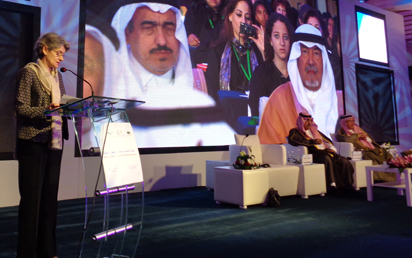From 3 to 5 December, the UN Secretary-General’s Envoy on Youth Ahmad Alhendawi was in Jeddah to participate in the International Conference on Youth Volunteerism and Dialogue, jointly organised by the Saudi Arabian Ministry of Education, the King Abdulaziz Centre for National Dialogue (KANCD), and UNESCO.
The conference came to emphasize the important role of dialogue in the promotion of peace and sustainable development, and brought together an audience of 170 participants, including youth with volunteer experience. The conference hosted five workshops, and revolved around themes such as nurturing a culture of dialogue; peace-building and humanitarian assistance; culture of peace and sustainable development; promoting cultural diversity and intercultural dialogue.
In his opening speech, Prince Faisal bin Abdullah Al Saud said: “Young people make up a majority in the population of the Kingdom of Saudi Arabia. They will build the future – and we will provide them the means and opportunities so that, with their talents and creative energy, they can achieve their ambitions for the future they want, which is increasingly rooted in sustainability.”
The UNESCO Director-General, Ms. Irina Bokova, and Faisal bin Abdulrahman bin Muammar, Secretary-General of the King Abdulaziz Center for National Dialogue as well as the King Abdullah bin Abdulaziz International Centre for Interreligious and Intercultural Dialogue also addressed the participants on the importance of colunteersim as a tool to promote a culture of dialogue among people.
In his keynote speech, Alhendawi noted the importance of recognising the role of youth volunteerism and the contribution of young volunteers to sustainable development of their communities, and societies at large.
The opening ceremony provided an opportunity to award the eight winners of the first-ever “Global Contest for Mutual Understanding”, which received over 1,300 contributions from youth aged 14 to 25. For more information on the winners, click here



